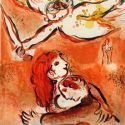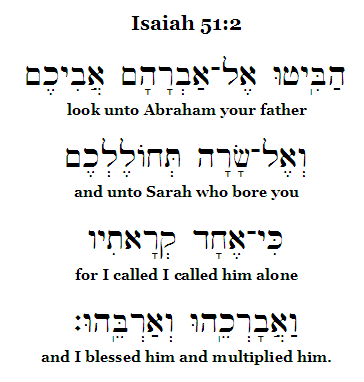by John J. Parsons
www.hebrew4christians.com
The Akedah of Sarah
Recall that Sarah gave birth to Isaac when she was 91 years old (Gen. 17:17, 21), and she later died when Isaac was 36 years old, at the age 127 (Gen. 23:1). And while the Torah does not explicitly state the cause of her death, we are told about her death following the dramatic episode of the sacrifice of Isaac (Gen. 22), and the midrash Tanchuma links the two events together by saying Sarah died from shock after learning about the ordeal of her son at Moriah. How could she comprehend Abraham's actions? Was he insane? And what about Isaac? How could Sarah bear the terror her son must have endured? It was just too much for her heart to bear: "And a sword will pierce through your own soul also..." (Luke 2:35). And what about the cherished dream of the family to be God's chosen people on the earth? Because of this great trauma, Jewish tradition states that her soul departed from her....
The midrash elaborates by explaining that after Abraham's early departure (for Moriah) Sarah grew more and more worried about the welfare of her son. By the third day - the day of the Akedah itself - she decided to go look for him. When Sarah reached Hebron, however, the evil one disguised himself as her (disfigured) son. When she saw him, she asked: "My son, what has your father done to you?" He answered, "My father took me and made bound me on the altar. He then took the knife to slaughter me. If the Holy One had not called out, 'Do not cast your hand on this boy,' I would have been slaughtered." When she heard how her son had been bound on the altar, Sarah was so overcome with fright that her soul had departed from her" (Midrash Tanchuma).
Therefore when the Torah says, "And Abraham came to mourn for Sarah and to cry for her" (Gen. 23:2), the sages say that he was returning directly from Mount Moriah, the place of the sacrifice of Isaac. (This also explains why Isaac was not present at his mother's funeral since he had fled from Abraham and sought refuge with Shem in Salem after the terrifying ordeal). In the Torah text the phrase "and to cry for her" (וְלִבְכּתָה) is written with a diminutive letter Kaf, which has led some of the commentators to explain that Abraham's mourning for his deceased wife was restrained. But how are we to understand this? The sages state that the death of Sarah was yet another severe test for Abraham. Would he now regret his faithful obedience to the LORD because of the loss of his wife? The Akedah settled the question that Abraham loved God more than even his beloved son, but the death of Sarah was another matter.... Since Abraham believed that God would raise his son from the dead, perhaps he likewise believed that God would raise his wife from the dead (Heb. 11:17-19). At any rate, to indicate that Abraham loved God unconditionally, the letter Kaf was written smaller, suggesting that his mourning was tempered with continued trust in God's will and plans...
It is a provocative thought that Sarah - not Isaac - was the real victim of the Akedah. She, not Isaac, is the one who dies, after all. Jewish tradition has associated the cries of Sarah with the blasts of the shofar during Rosh Hashanah. The broken notes of the shofar are thought to recall her crying for her son...
From another perspective we note that Isaac was the first "Jewish baby" born to the world, the very promised son, the miracle child and the heir of Abraham. As the firstborn son of Abraham, without him there would be no salvation to come... So when Sarah heard that Isaac was offered at Moriah, her soul departed from her and she thought the world was falling apart. She prayed to God: "Let me die for my son; let me die in place of my son..." Sarah's love was so great it brought Isaac back to life from the dead.
Various sages wonder why Sarah lived only 127 years while Abraham lived to be 175, that is, 48 years more? They answer that Sarah's years amounted to the number of years Abraham lived as ha-Ivri (הָעִבְרִי), "the Hebrew," a term that identifies his relationship to the one true God (for more, see "Abraham the Hebrew"). Since Abraham was 48 years old when he came to believe, and a convert is regarded as a newborn, then Abraham lived (as a Hebrew) exactly 127 years, precisely as long as did Sarah (who was regarded a prophetess from birth). For more about this, please see the article "The Greatness of Sarah."
Hebrew Lesson:
Genesis 22:2a Hebrew Reading (click):
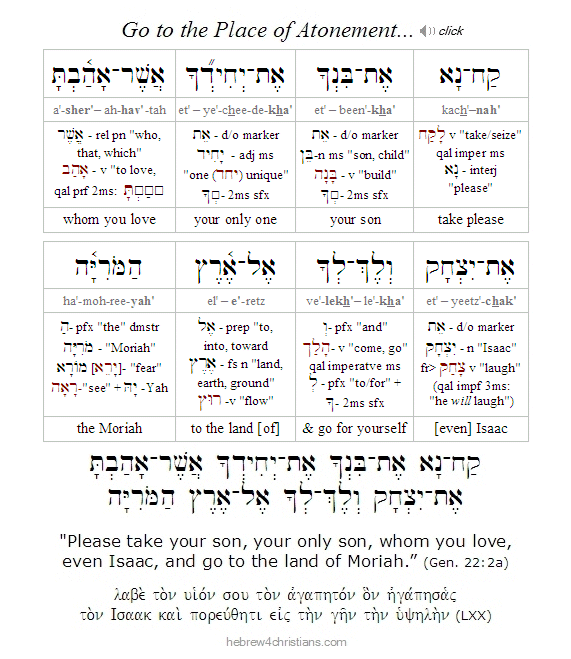
- Gen. 22:2a Hebrew page (pdf)
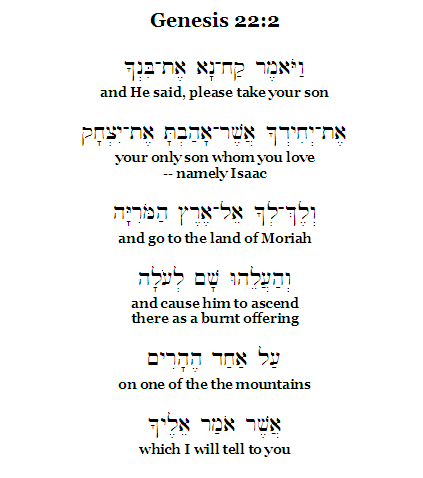 |
Note: We study Torah and the lives of the patriarchs because it is part of our great yerushah (יְרוּשָׁה), our heritage, in Messiah Yeshua... The Torah tells our story as the people of God; it is the context and framework of the entire Bible. As it says: "Listen to me, you who pursue righteousness, you who seek the LORD (שִׁמְעוּ אֵלַי רֹדְפֵי צֶדֶק מְבַקְשֵׁי יְהוָה): look to the rock from which you were hewn, and to the quarry from which you were dug. Look unto Abraham your father and to Sarah who bore you; for he was but one when I called him, that I might bless him and multiply him" (Isa. 51:1-2).
Hebrew Lesson:
Isaiah 51:2a Hebrew Reading (click):
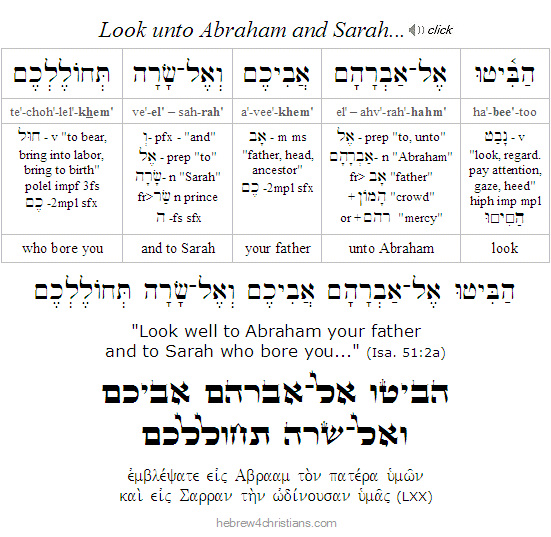 |
- Isa. 51:2a Hebrew page (pdf)
Related Discussion:
- The Gospel in the Garden
- Melchizedek and the Messiah
- The Seed of Abraham
- The Sacrificed Seed (the Akedah)
- The Journey to Moriah...
- The Passion of Isaac
- The Akedah of Sarah
- The Temptation of Grace
- Midrash of the White Ram
- The Seed of Isaac (Jacob)
- Israel and the Akedah
- Jacob's Vision of the Messiah
- The Promise of Shiloh (Messiah of Judah)
- Joseph as a type of Messiah
- The Gospel According to Moses
- Prophet Like Moses
- Passover and the Gospel
- Rosh Hashanah
- Yom Kippur and the Gospel
- Rabbis who deny Blood Atonement
- The High Holidays and the Gospel
- Names of God: Messiah
- Paul's Allegory of Hagar and Sarah
- Hebrew Wordplay and Isaac
- The Angel of the LORD
- Abraham's Three Visitors
- Eliezer and Ruach HaKodesh
- The Akedah Prayer
- Jewish Philosophy of History
Hebrew for Christians
Copyright © John J. Parsons
All rights reserved.
